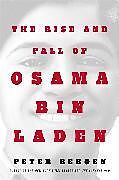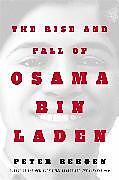The Rise and Fall of Osama bin Laden
Einband:
Fester Einband
EAN:
9781982170523
Untertitel:
Englisch
Genre:
Geschichte
Autor:
Peter L. Bergen
Herausgeber:
SIMON & SCHUSTER
Anzahl Seiten:
416
Erscheinungsdatum:
16.09.2021
ISBN:
978-1-982170-52-3
"The author’s encyclopedic familiarity with his subject and his interviews with almost every key player are complemented by a succinct, almost laconic, writing style... An excellent primer for the general reader... The author’s mastery of the detail gives him an unmatched authority and he makes decisive pronouncements on some controversial issues." — The Cipher Brief
"Well-written and meticulously researched book draws heavily on the treasure trove of material that was captured by the US Navy Seal team that carried out the raid on bin Laden’s Abbottabad lair that resulted in his death." — The National
"Well written. Its prose is crisp and clean. Its style will appeal to specialists and non-specialists alike...The result is an enjoyable and informative read." — Washington Free Beacon
"A compelling, nuanced portrait of America’s erstwhile public enemy No. 1... Throughout, Bergen turns up revealing details and sharp arguments against received wisdom... Essential for anyone concerned with geopolitics, national security, and the containment of further terrorist actions." —Kirkus Reviews (starred review)
"Bergen adds intriguing new details to the story of Osama bin Laden in this solid, well-sourced biography....Surprising insights and fluid prose enrich this authoritative portrait of the terrorist leader and the movement he inspired. Foreign affairs buffs will be fascinated." — Publishers Weekly
"Bergen's detailed, incisive, and clarifying biography is an invaluable work marking 9/11's twentieth anniversary.... Recounts bin Laden's ruthless rise to power, al-Qaeda’s early successes, and bin Laden's last bitter years, leading to an excellent summary of bin Laden’s effect on American and international politics." — Booklist
Autorentext
Peter Bergen is the author or editor of eight books, including three New York Times bestsellers and four Washington Post best nonfiction books of the year. A Vice President at New America, Bergen is a professor at Arizona State University and a national security analyst for CNN. He has testified before congressional committees eighteen times about national security issues and has held teaching positions at Harvard and Johns Hopkins University.
Klappentext
"The world's leading expert on Osama bin Laden delivers for the first time the definitive biography of a man who set the course of American foreign policy for the 21st century, and whose ideological heirs we continue to battle today"--
Leseprobe
Chapter 1: Sphinx Without a Riddle? ONE SPHINX WITHOUT A RIDDLE?
A sphinx without a riddle.
—Bismarck on Napoleon III
Around the time of the 9/11 attacks, relatively little was known about Osama bin Laden. In the rare television interviews that al-Qaeda’s leader had given before then he came across as largely inscrutable, with only an occasional thin, enigmatic smile playing across his lips. He had gone to considerable lengths to keep information about his private life hidden, which wasn’t surprising since he had grown up in Saudi Arabia, one of the most closed societies in the world. He also led an organization, al-Qaeda, whose very existence was a well-kept secret for a decade after its founding in the late 1980s. The bin Laden family, one of the richest in the Middle East, had also largely avoided scrutiny. Was the leader of al-Qaeda a sphinx without a riddle?
In recent years a great deal of information has surfaced to illuminate bin Laden and the inner workings of al-Qaeda. First there is the small library of documents found in bin Laden’s Abbottabad compound that were released in full only in late 2017, amounting to some 470,000 files. Secondly, many bin Laden associates have finally shown a willingness to talk. The result is that a decade after his death, it is now possible to appraise him in all the many dimensions of his life: as a family man; as a religious zealot; as a battlefield commander; as a terrorist leader; as a fugitive. He was born a young man of contradictions, and he kept adding to them: he adored his wives and children, yet brought ruin to many of them. He was a multimillionaire, but he insisted his family live like paupers. He projected a modest and humble persona that appealed to his followers, but he was also narcissistically obsessed about how his own image played out in the media, and he ignored any advice from the leaders of al-Qaeda that conflicted with his own dogmatic views. He was fanatically religious, yet he was also willing to kill thousands of civilians in the name of Islam, despite the fact that some verses of the Koran emphasize the protections afforded to innocents, even in times of war. He inspired deep loyalty, yet in the end, even his longtime bodyguards turned against him. And while he inflicted the most lethal act of mass murder in United States history, bin Laden failed to achieve any of his strategic goals.
Al-Qaeda’s leader is one of the few people of whom it can truly be said changed the course of history. Who could have predicted that in the two decades following the 9/11 attacks he masterminded, the United States would wage various kinds of military operations in seven Muslim countries—in Afghanistan, Iraq, Libya, Pakistan, Somalia, Syria, and Yemen—at the cost of more than $6 trillion and more than seven thousand American lives? In addition, tens of thousands of soldiers from countries allied to the United States died, as did hundreds of thousands of ordinary Afghans, Iraqis, Libyans, Pakistanis, Somalis, Syrians, and Yemenis who were also killed during the “war on terror.”
But just as it has taken many years to get a better understanding of the man who launched the 9/11 attacks, it has taken two decades to assess the successes and failures of both al-Qaeda and the United States in the long conflict that followed. This is not to suggest any moral equivalence between the two—but rather to explain where each side miscalculated the other’s intentions and actions.
Al-Qaeda did have some tactical successes. Before the 9/11 attacks it deftly exploited its safe haven in Taliban-controlled Afghanistan to train thousands of militants. On 9/11 al-Qaeda carried out the first significant foreign attack against the continental United States since the British burned the White House in 1814. Al-Qaeda used the opportunities presented by the Iraq War to recruit a new generation of militants, planting the seeds for ISIS. And al-Qaeda expanded its affiliated groups from Africa to Asia.
There were also serious American policy failures. They include letting bin Laden escape at the battle of Tora Bora in December 2001, which allowed him to lead his organization for another decade, and the conflation of al-Qaeda with Saddam Hussein, which helped make the case for the Iraq War, a war that ultimately produced the very thing it was supposed to prevent—an alliance between al-Qaeda and Iraqi Baathists.
But bin Laden and al-Qaeda also had many failures of tactics and strategy. For one thing, the United States eventually came up with an increasingly effective tactical playbook against al-Qaeda and other jihadist militant groups—a playbook that largely, if imperfectly, worked, relying on armed drones, a much-expanded intelligence community, and Special Operations F…

Leider konnten wir für diesen Artikel keine Preise ermitteln ...
billigbuch.ch sucht jetzt für Sie die besten Angebote ...
Die aktuellen Verkaufspreise von 6 Onlineshops werden in Realtime abgefragt.
Sie können das gewünschte Produkt anschliessend direkt beim Anbieter Ihrer Wahl bestellen.
Loading...
Die aktuellen Verkaufspreise von 6 Onlineshops werden in Realtime abgefragt.
Sie können das gewünschte Produkt anschliessend direkt beim Anbieter Ihrer Wahl bestellen.
| # | Onlineshop | Preis CHF | Versand CHF | Total CHF | ||
|---|---|---|---|---|---|---|
| 1 | Seller | 0.00 | 0.00 | 0.00 |
